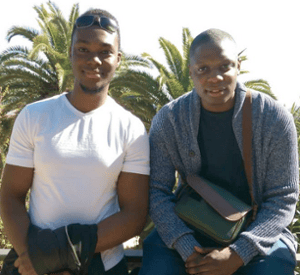Don’t close your eyes: waking up to climate change
Word on the Curb’s young film-makers talk about why they wanted to focus on their generation’s apathy to the realities of global warming
Word on the Curb is a collective of artists who use film and spoken word as a tool to engage young people in important issues that affect them.
We spoke to co-founder Hayel Wartemberg, 22, about their new film, ‘Don’t close your eyes’. The film was created specifically for the Guardian’s #GroundUp campaign which is showcasing stories from young people who will feel the worst impacts of climate change.
How did you get into filmmaking?
Originally it was through plucking video clips off YouTube that featured football players I admired – like Paul Scholes and Ronaldino – and making them into montage videos.
I then studied politics at A-level (16-17) and rather than just doing run of the mill essays to express my views, I decided to use film to get my opinions across. Before long I was writing and producing lots of films. I have always been a creative person and it just felt like a natural storytelling tool for me.
Why do you think spoken word is becoming such a powerful storytelling tool with your generation?
By stripping out the beat, spoken word takes us back to storytelling in its most primal form. As children, our parents read us bedtime stories. This basic storytelling teaches us an economy of language we use to get our messages across. I think spoken word represents a primal and beautiful way to tell a story.
A lot of my generation feel like music these days doesn’t represent us. By taking away the beat, spoken word is an offspring, a love-child if you will, of the hip-hop so many of us loved growing up. It is a language of pure expressionism.
How did Word on the Curb come into existence?
All the Word on the Curb founders studied at Manchester University and we would find ourselves discussing gender politics and race relations at three in the morning on the way home from parties.
We felt that the issues we were discussing affected so many young people like us, and from there Word on the Curb was born. I remember at the time we collectively scraped together the money to buy a Nikon D3100 [digital SLR camera] using our student loans. We were all so broke and although the camera wasn’t broadcast quality, it got the job done.

What inspired this treatment of the film?
We sat down as a team and thought: ‘What is the most daring and striking representation of the possibilities for our future if we don’t tackle climate change?’
We came to the conclusion that the focus should be on what we’re not doing now.
We came to the conclusion that the focus should be on what we’re not doing now.
We feel as young people that we’re closing our eyes to to the future because we can’t detect the subtle insidious changes that are occurring. Lots of countries are already experiencing droughts, famine, floods and extreme weather as a result of climate change. We wanted to create something that would wake people up to what is happening now.
Who wants to provide an uncertain and ambivalent future for the next generation? It is a dereliction of duty by those businesses and governments who are not doing enough to tackle climate change. Hopefully the piece represents the desperate urgency we feel is needed to wake our generation up from their general apathy towards climate change as an issue to care about.
Do you feel that great stories arise from challenging political times?
My generation is old enough to remember 9/11 – we’re the austerity generation who have witnessed massive cuts to the state and the support system for young people. Borne out of this struggle, wonderful angst finds itself. The spoken word movement is a new musical riot.
The rise of social media has allowed poets new ways to express our ideas. It is cool how things have changed. I think the spoken word artists are redefining what it means to be a poet.
I feel, having grown up in an internet revolution, that people are much more fearless. They’re also more ambitious, out there, free and progressive.
Are you hopeful for the future?
When we were making the ‘Don’t close your eyes’ film, I felt hopeful; we are part of a progressive generation who are ready to hold businesses and government to account. We can create a better future for our kids and future generations.
We are not going to let them get away with destroying the things we love.
Comments